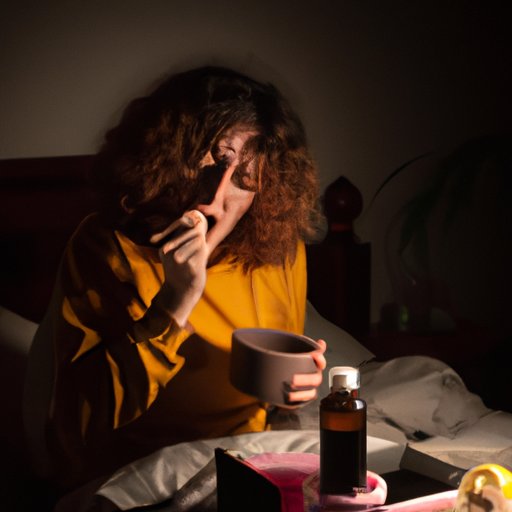Introduction
Do you often find yourself coughing uncontrollably at night, disrupting your sleep and leaving you feeling exhausted the next day? If so, you’re not alone. Nighttime coughing affects millions of people worldwide and can be caused by a variety of factors, such as allergies, GERD, or asthma. The good news is that a range of natural remedies, lifestyle changes, and medications can help alleviate nighttime coughing symptoms and improve your overall quality of life. In this article, we’ll explore some practical tips and advice on how to stop coughing at night and get the restful sleep you need.
Home Remedies
Many natural or herbal remedies can be effective in reducing nighttime coughing symptoms. For example, warm water can help soothe an irritated throat, while herbal teas like chamomile or ginger can help reduce inflammation and promote relaxation. Using a humidifier or vaporizer in your bedroom can also help moisten the air and ease coughing. Additionally, aromatherapy, using essential oils such as eucalyptus or peppermint, may help alleviate coughing symptoms. To use these remedies effectively, try sipping warm water before bedtime or incorporating essential oils into massage or baths.
Medications and Over-the-Counter Options
If herbal remedies aren’t effective, several over-the-counter or prescription medications can help alleviate nighttime coughing symptoms. Understanding the difference between cough suppressants and expectorants is essential. Expectorants help loosen mucus and make it easier to cough up while cough suppressants block the cough reflex. Some medications combine these two actions. The option best suited for you needs to be discussed with your doctor. Alternative treatments like acupuncture may also be effective in reducing persistent coughing symptoms.
Bedtime Routine
Adjusting your sleep habits may be helpful in reducing nighttime coughing. Raising your head using extra pillows can help prevent mucus from pooling in your throat, enabling you to breathe easier through the night. Relaxation techniques like meditation or yoga can help lessen the impact of stress, which may worsen coughing symptoms. Breathing exercises like pursed-lip breathing or deep diaphragmatic breathing can also increase lung function, helping to alleviate cough symptoms. A consistent sleep schedule can help in improving your sleep patterns while also reducing coughing symptoms.
Lifestyle Changes
Lifestyle changes can make a difference in reducing nighttime coughing. Putting away electronic devices and avoiding exposure to environmental allergens as much as possible can help curtail coughing symptoms. Cigarette smoking can also worsen cough symptoms and may trigger asthma symptoms. Identify and remove common triggers in your environment to avoid worsening the symptoms.
Diet and Hydration
Diet can play a role in reducing symptoms. Eating foods that do not irritate the airways, such as spicy foods, caffeine, or dairy products, can reduce coughing. Drinking plenty of water and staying hydrated throughout the day can help improve your overall respiratory system. Drinking warm water with honey or lemon may also help reduce throat irritation.
Identify the Cause
Identifying the underlying cause of nighttime coughing is key to finding effective treatment. Sinusitis, allergies, GERD, and asthma are some of the common causes of nighttime coughing. Identifying the cause and seeking medical attention can help address persistent coughing symptoms and improve quality of life. Sometimes, underlying medical conditions can lead to cough symptoms, and in such cases, get in touch with your healthcare provider as early as possible.
When to See a Doctor
Although self-care measures are often effective, it’s essential to seek medical attention if persistent coughing doesn’t stop. Red flags to watch for coughing include coughing blood or yellow-green phlegm, wheezing or shortness of breath, chest pain, or night sweats onset. Visiting your physician can establish the root cause of the coughing, and they can suggest the best treatment options.
Conclusion
Nighttime coughing can be a frustrating and exhausting issue, impacting your quality of life. However, several remedies, lifestyle adjustments, and medications are effective in alleviating nighttime coughing symptoms and ensuring a restful night’s sleep. By trying different tips and strategies, and seeking the advice of your physician where need be, you can find a solution that will help you reduce nighttime coughing symptoms and improve overall health.
